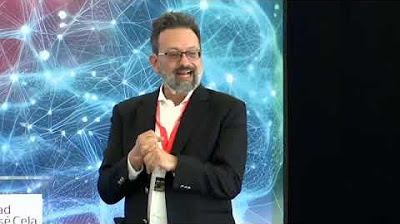Luciano Floridi | I veri rischi e le grandi opportunità dell’Intelligenza Artificiale
Summary
TLDRThe transcript explores the concept of artificial intelligence (AI), emphasizing its complexity and potential as a tool for human-defined objectives. It discusses the importance of transparency and the risks associated with AI's opacity, such as manipulation of public opinion and environmental impact. The speaker highlights AI's role in solving practical problems and its potential to positively transform various sectors, including agriculture and manufacturing. The conversation also touches on the societal and environmental implications of AI, advocating for a balanced approach to harness its benefits while mitigating risks.
Takeaways
- 🤖 Artificial Intelligence (AI) is a varied and sometimes vague concept, often defined in numerous ways by different sources.
- 📜 The European legislation (AI Act) and the Executive Order by President Biden both provide specific definitions of AI, highlighting its role in achieving human-defined objectives.
- 🔍 AI can be seen as a system that performs tasks requiring human intelligence if done by us, such as playing chess at an expert level.
- 🧠 Transparency in AI is a complex issue, involving both the complexity of the systems and the lack of transparency from companies producing AI technologies.
- 💡 AI's potential applications are vast, including solving complex problems like protein folding and reducing energy consumption in data centers.
- 🌍 AI can significantly contribute to addressing global challenges like climate change, but its environmental impact needs more focus in legislation.
- 🏭 The impact of AI on the workforce is profound and rapid, transforming the way we work and necessitating social support systems for those affected.
- 📈 AI is not just about job displacement but also about reimagining entire production processes to be more efficient and environmentally friendly.
- 🌐 Both European and American approaches to AI have their merits, with Europe focusing on risk management and human rights, and the U.S. emphasizing economic benefits and competition.
- 📚 Education and widespread understanding of AI are crucial to ensure it is not just an elite technology but something accessible and beneficial to all.
- 😌 Optimism for the future is encouraged, as humanity's intelligence has historically been capable of overcoming challenges and leveraging new technologies for the greater good.
Q & A
What is the definition of artificial intelligence as discussed in the transcript?
-Artificial intelligence is defined as any system that performs tasks that would require human intelligence if they were to be done by us.
How does the speaker describe the transparency issue with AI?
-The speaker describes the transparency issue with AI as multifaceted, involving the complexity of the system itself and the lack of transparency from the companies producing AI technologies.
What are the potential risks associated with AI as mentioned in the transcript?
-The potential risks include the manipulation of public opinion, creation of monopolies, environmental impact, societal injustice, bias in various sectors, and political manipulation.
How does the speaker suggest we should approach AI?
-The speaker suggests that we should focus on the practical applications of AI to solve real-world problems and enhance human capabilities, rather than focusing on the dystopian fears often associated with AI.
What is the role of AI in the context of environmental issues?
-AI has the potential to significantly contribute to solving environmental problems, such as climate change, through its computational power and problem-solving abilities.
How does the speaker view the future of work in relation to AI?
-The speaker views the future of work as undergoing profound transformations due to AI, with the potential for increased efficiency and productivity, but also emphasizes the need for social protection and re-skilling for those whose jobs may be affected.
What is the main difference between the European and American approaches to AI regulation as described in the transcript?
-The European approach is more focused on risk assessment and protecting human dignity and rights, while the American approach is more oriented towards economic benefits, competition, and innovation.
How does the speaker address the issue of AI and its impact on the job market?
-The speaker acknowledges that AI will lead to transformations in the job market, but emphasizes the need for social policies to support those whose jobs may be displaced and for education and training to align the workforce with the skills needed for the new job market.
What is the significance of the 'Three Body Problem' in the context of AI transparency?
-The 'Three Body Problem' is used as an analogy to illustrate the complexity and unpredictability of systems with many interacting components, which makes transparency and understanding of AI systems more challenging.
What examples does the speaker provide to demonstrate the practical applications of AI?
-The speaker mentions AI's role in protein folding, energy consumption reduction in data centers, and the management of city services such as road works, libraries, and parking in smart cities like Amsterdam and Helsinki.
How does the speaker propose we should deal with the challenges posed by AI?
-The speaker proposes that we should focus on education, social policies, and legislation to ensure that AI is used responsibly and ethically, and that its benefits are accessible to all.
Outlines

This section is available to paid users only. Please upgrade to access this part.
Upgrade NowMindmap

This section is available to paid users only. Please upgrade to access this part.
Upgrade NowKeywords

This section is available to paid users only. Please upgrade to access this part.
Upgrade NowHighlights

This section is available to paid users only. Please upgrade to access this part.
Upgrade NowTranscripts

This section is available to paid users only. Please upgrade to access this part.
Upgrade NowBrowse More Related Video

L’intelligenza artificiale ha una coscienza?

O QUE É A INTELIGÊNCIA ARTIFICIAL (AI)?

Mis on tehisintellekt? Sissejuhatus tehisintellekti. Mõisted | VIDEOÕPS Informaatika. AI #1

AI Solutions for Teachers and Professors

The future of AI, work, and human potential | Lars Thomsen | TEDxHWZ

What is the AI Singularity?
5.0 / 5 (0 votes)